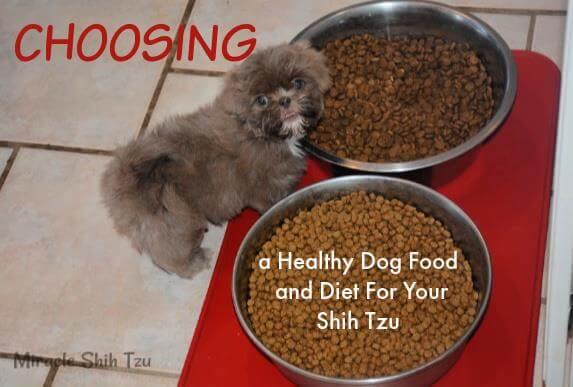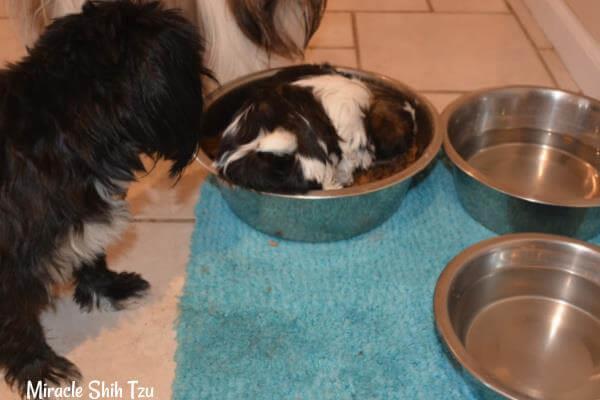Choosing a Healthy Dog Food and Diet for Your Shih Tzu
Choose a Healthy Dog Food, By Roy Emerson |Updated 02-12-2024
Some pet owners firmly believe that standard dry dog food provides all of the essential nutrients that a dog needs to maintain a healthy body.
However, they may not be aware of how harsh the cooking process can be for dry food.

Although not specifically a task associated with Shih Tzu grooming, ensuring your Shih Tzu has a properly balanced and nutritious diet is imperative to keep your Shih looking and feeling their best.
Not unlike humans, dogs also require a balanced diet to maintain optimum health, weight, and well-being.
Certain foods, ingredients, and food containers have the potential to cause your Shih Tzu damage and should be avoided.
Conversely, certain foods will give your Shih a healthier looking coat, better digestive movements, and promote longevity.
In this article, I will discuss some do’s and don’ts of diet and offer some general recommendations on maintaining optimum nutrition.
Choosing a Healthy Dog Food
It should be remembered first that Shih Tzu’s are a small breed of dogs, and hence don’t tend to eat very much.
Thus, it is important not to overfeed your dog, as this can lead to them becoming overweight and eventually obese, which can trigger a variety of health problems.
Whilst in some people’s eyes an overweight puppy might look cute, their health is suffering.
Obesity in dogs is a problem which can lead to a variety of serious and fatal diseases, including but by no means limited to abnormalities with the metabolic and digestive system, cardiorespiratory illness and failure, decreased overall immune function, and ultimately a shortening of lifespan.
So, we certainly don’t want to put little Shih through any of that!
It would help if you were careful about food allergies which certain dog foods could potentially provoke in your Shih Tzu.
It is generally estimated that around close to 1/3 of all Shih Tzu’s are susceptible to food allergies. Given this, you need to be able to read the ingredients carefully of any dog food you are buying, in case it could potentially trigger an allergy.
Types of Healthy Dog Food
There is much debate among Shih Tzu owners whether food should be cooked or raw, which fats are good and bad, how much grain is acceptable in dog food, how much meat content and its source, and so and so forth.
Ultimately, whilst there are some general guidelines, your dog will likely have specific needs, and there is not a ‘one size fits all’ diet. You will need to learn to read the labels carefully to be able to make an informed decision for your pet.
Furthermore, it is best to closely monitor your Shih Tzu’s health if you put them onto a new dog food to ensure they don’t experience any adverse health impacts. Introduce the new food over the course of a week.
A Healthy Dog Food Should Not Contain These Ingredients
Generally, I would suggest trying to avoid dog foods which have a high content or concentration of any of the following ingredients:
Highly Processed or Artificial Meat
Highly processed or artificial meat or meat substitutes. It is best to give your Shih Tzu non -processed pure meats.
Grains, Soy, Gluten
High amounts of grain, soybeans or soy flour, corn or wheat gluten. These tend to cause allergies in dogs and create difficulties with digestion.
Animal or Poultry Fat
Animal or poultry fat. Just gross. Very cheap pet foods often can contain ‘animal fat’ which usually does not list a specified animal source. Only need to use your imagination to think about what it could include. Avoid.
Preservatives such as BHA, BHT or HFCS
Nasty preservatives such as BHA (Butylated hydroxyanisole), BHT (butylated hydroxytoluene) or HFCS(High fructose corn syrups – yes, they put these in dog food as well).
Whilst the scientific view is mixed on whether these can cause damage to your pet, I am sure of the opinion that if they can be avoided, avoid them. Most healthy dog food brands do not use these chemical preservatives but rather will use a natural preservative that is healthier for your dog.
They are highly unnatural chemicals used to preserve food and ultimately can produce undesirable health and behavioural changes. I encourage you to do some more reading on these and be informed. I would also include here any other types of sugars or sweeteners.
No Grapeseed Extract/Grape Pomace
Grapeseed extract/grape pomace. These can seriously upset your dog’s stomach.
Fillers
Fillers such as brewer’s rice, by products and rice flour. These have little nutritional value and can cause allergies.
Personal Preferences for a Healthy Dog Food

As a broad guideline, I tend to go for more ‘natural’ or ‘holistic’ style products, which often contain organic ingredients and are not full of preservatives and other junk.
These can be a bit more expensive, but ultimately, will provide a much better nutritional basis for your dog. I would personally recommend Newman’s brand dog food, which has done my Shih Tzu wonders since switching over.
Some dog owners might complain about the cost, but really, can you put a price on your dog’s health and well-being? I wouldn’t think so, and I certainly don’t!
If you aren’t confidently purchasing a particular dog food yourself, or you notice your Shih having adverse reactions, you should talk to your vet or pet nutritionist to help overcome any concerns you may have and potentially design a specific diet for your Shih Tzu.
Some people are also interested in a purely home prepared diet for their dog.
I find this to be an overly time-consuming option, and further, you need to have a very intimate understanding of your Shih Tzu’s digestive system to make this work.
I would avoid this unless you find your Shih to have particular requirements.
Additional Tips For Serving Healthy Dog Food
As an adjunct to picking a good dog food and staying with it, some other general guidelines worth following are:
Always serve fresh clean water
Ensure your dog has enough fresh, clean water to drink all the time. Water aids a lot in digestion and prevents dehydration.
Use Stainless Steel Serving Bowls
Use stainless steel serving bowls. Plastic bowls are cheap and tend to harbour germs and bacteria, which can make your dog sick.
Limit the Amount of Food Scraps
Avoid feeding too many food scraps to your Shih. You might feel it’s a shame to throw food out. However, leftovers can potentially leave little Shih vomiting and unwell.
Monitor Your Shih Tzu for Signs of Upset
Ultimately, whilst there are some general guidelines, your
dog will likely have specific needs, and there is not a ‘one size fits all’
diet. You will need to learn to read the labels carefully to be able to make an
informed decision for your pet. If you're interested in more detailed
insights into various dog food options, you can also check out dog food reviews
and ratings.
You will want to monitor your dog’s health for any signs of upset which could be indicators of poor diet. Vomiting and diarrhea are the first signs you may notice. Bloat and flatulence are also indicators.
A good diet is the best preventative measure against disease and provides strong, healthy teeth, good behaviour, a shiny, thick coat, and proper digestion. If you notice your dog is not at his/her best, it might be time for a nutritional check-up.
Author Bio:
Choosing a Healthy Dog Food and Diet For Your Shih Tzu
Roy Emerson is a technology enthusiast, a loving father of twins, is a blog editor of PetApproves.com, and Greedy reader and gardener.
"Hi, I'm Janice Jones, a former veterinary technician and Shih Tzu expert with over 40 years of experience with the breed. Through Miracle Shih Tzu, I combine my medical background and extensive breed knowledge to provide reliable, practical advice for Shih Tzu owners. My mission is to help you give your Shih Tzu the happiest, healthiest life possible through evidence-based information and real-world solutions. Whether you're new to the breed or a seasoned owner, you'll find trusted guidance here for all aspects of Shih Tzu care.
I hold an undergraduate degree in Psychology with a minor in biology, Early Childhood Education, and Nursing, and a Master's in Mental Health Counseling.



